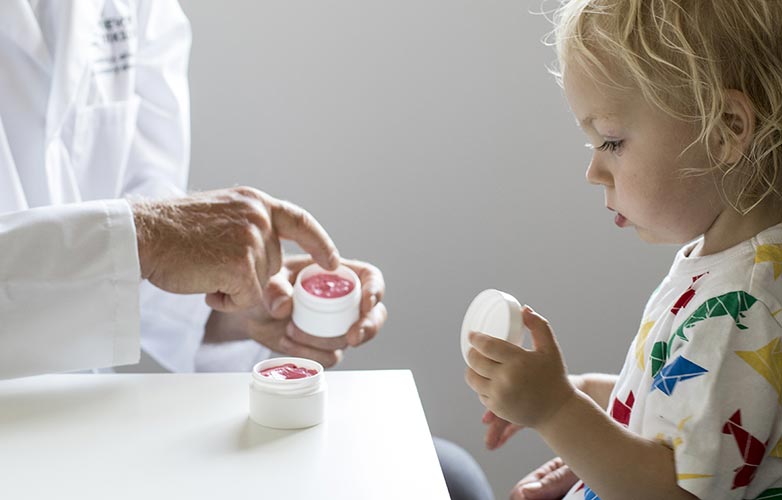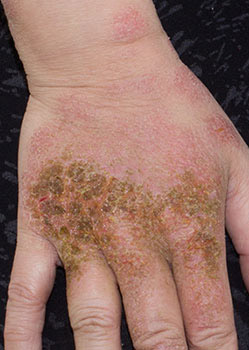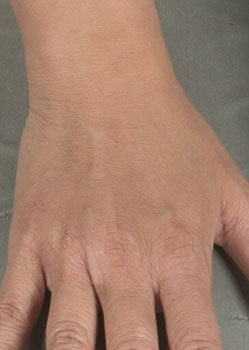Atopic Eczema
Atopic eczema is the most common inflammatory disease of the skin. It is chronic, relapsing and may affect a person throughout their entire life. It most often begins in early childhood, but can occur at any age. At root it is an over-reactive immune response to allergens, which then predisposes you to other allergic disorders such as allergic rhinitis (hay fever), asthma, food allergies and urticaria. Up to 80% of sufferers have a family history of one or more of these allergic disorders.
Chinese medicine has successfully treated atopic eczema for several hundred years, originally calling it ‘Wind of the four crooks (Si Wan fang), which is in relation to the disease’s tendency to affect the flexures of the elbows and knees.
 Symptoms
Symptoms
Atopic eczema is typically very itchy, with the desire to scratch being strong and unconscious. Bloody scratch marks are a trademark. The itching can be accompanied by a burning sensation and even pain. During a flare-up quality of life plummets as patients find it hard to sleep and feel constantly agitated by the itching and discomfort.
Atopic eczema often starts in infancy on the baby’s cheeks and then migrates to the torso, arms, legs and even the entire body as one ages. During its active stages there may be swelling and discharge of fluid, which may then form thick yellowish scabs. Alternatively, there may be great dryness, redness and profuse scaling of skin.
Eczema is related to imbalances in the immune system. People suffering from atopic eczema often also have secondary staph, viral (herpes, warts) and/ or fungal infections.
Treatment
Treatment involves individually designed and prepared herbal medicines that take into account the patient’s age, the severity of the eczema, how widespread it is, whether it is dry or oozing, as well as the overall health of the patient (digestion, quality of sleep, emotions, etc.). Typically patients are prescribed oral herbal medicines and possibly some herbal ointments to apply directly onto the skin, focusing first on calming down the inflammation. Once the condition is stable, then herbal medicines are used to help nourish and strengthen the skin as a means to help prevent the eczema from coming back. With infants under 1 year, however, they usually respond quite well to topical herbal washes and ointments and the internal medicines are often not needed.
Success
Most patients respond well to herbal treatment for atopic eczema. Overall success is related to the severity of the condition, but is also often determined by the previous use of steroids – either external applied or internally administered. The more one has used steroids to control their eczema, the harder it may be for herbal medicines to manage. It is thought that long term steroid use leads to more dysregulation of the immune system, creating a dependency, or addiction, to the steroid. (Dr. Erikson’s wife went well over 10 years without any eczema after she stopped treatment with herbal medicines).
Interview with Dr. Erikson discussing the use of Chinese medicine in the treatment of skin disease.
Modern research has confirmed that Chinese herbal medicine may help patients with atopic eczema. In two of the first double-blind crossover research studies on Chinese herbal medicine for atopic eczema conducted in England, clear benefit was observed in both the children and adult groups. Basically, around 75% of children experienced almost total clearing (at least 90%) and 70% of the adult group experienced almost total clearing (at least 90%) while taking the herbal medicines. A one year follow on both groups showed the benefit was long term and that the skin remained quite stable.
‘This study has shown that Chinese herbal therapy produces a sustained remission of disease activity in patients whose atopic eczema had been unresponsive to a variety of conventional treatments (like treatment with topical steroids)’ – Cl. and Experimental Dermatol. 1995 March; 20(2): 136-140
‘The Traditional Chinese Medicine herbal concoction is efficacious in improving quality of life and reducing topical corticosteroid use in children with moderate‐to‐severe AD. The formulation was palatable and well tolerated.’ – Br J Dermatol. 2007 Aug; 157(2):357-363
‘We conclude that Chinese medicinal herbs provide a therapeutic option for children with extensive atopic eczema which has failed to respond to other treatments.’ – Br J Dermatol. 1994 Apr;130(4):488-93.
‘(Chinese herbal medicine) is effective in decreasing the severity of the disease and improving the quality of life in patients with moderate-to-severe AD.’ – Complementary therapies in medicine 2015 Oct;23(5):644-651

before

after
